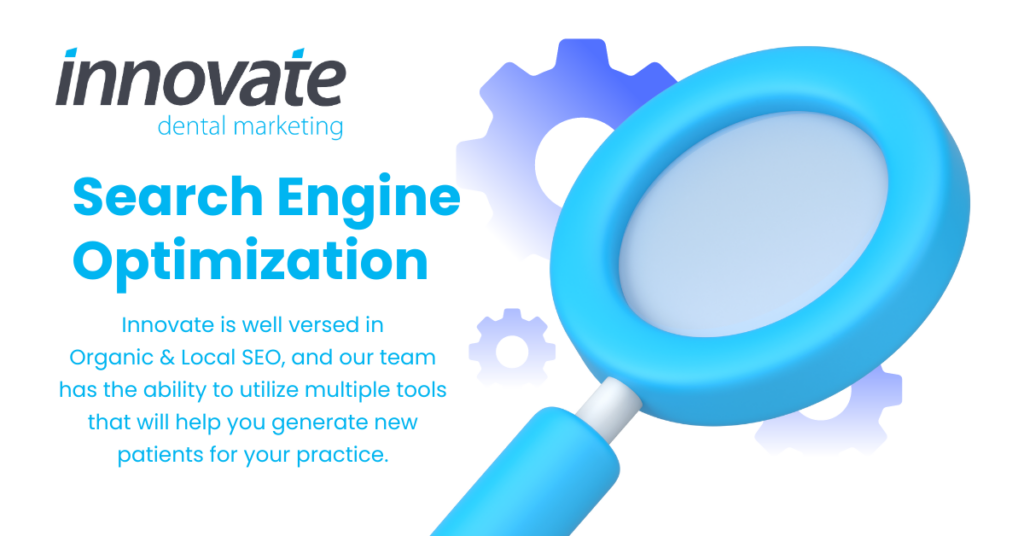The Ultimate Guide to Dental SEO: How to Rank Your Practice Higher on Google
April 5 , 2024

With the increasing reliance on the internet for information and services, it’s imperative for dental practices to establish a robust online presence. Millions of people turn to search engines like Google, to find dental services every day, and it’s essential for your practice to rank high in search engine results. This is where Search Engine Optimization (SEO) comes into play. In this comprehensive guide, we’ll delve into the intricacies of dental SEO, covering both Organic SEO and Local SEO strategies to help your practice climb the ranks and stand out amidst the digital competition.
Understanding Dental SEO
Before diving into strategies, it’s important to understand what dental SEO entails. Essentially, dental SEO is the process of optimizing your practice’s website to improve its visibility and ranking on search engine results pages (SERPs).
SEO isn’t a one-size-fits-all solution; it requires tailored strategies to suit the unique needs of dental practices. Dental SEO involves optimizing various elements of your website to enhance its visibility in search engine results. From keyword research to local listings and back linking, every aspect plays a crucial role in determining your practice’s online success.
Organic SEO Strategies

In 2024, businesses must prioritize Organic SEO as Google maintains its focus on organic search results, emphasizing the need for strategic website optimization with relevant content, robust technical frameworks, and ethical link-building tactics to boost visibility and credibility. At Innovate, our proficient team stands ready to apply our deep knowledge of Organic SEO to propel your dental practice forward, utilizing a diverse array of potent tools to attract a consistent influx of new patients; and below are some of the key components to a successful Organic SEO Strategy.
Keyword Research: The Foundation of Dental SEO
Keyword research forms the cornerstone of any successful SEO strategy. Start by identifying relevant keywords and phrases that potential patients might use when searching for dental services in your area. Tools like Google’s Keyword Planner, Semrush, or Ahrefs can help you discover high-volume keywords with manageable competition.
For instance, if you’re a family dentist in Chicago, target keywords like “best family dentist Chicago” or “affordable dental care near me.” Incorporate these keywords naturally into your website’s content, including your homepage, service pages, and blog posts, to improve your chances of ranking for relevant searches.
Website Optimization
With the majority of internet users now accessing the web via mobile devices, ensuring your website is mobile-friendly is non-negotiable. Google prioritizes mobile-friendly websites in its search rankings, so optimizing your site for smartphones and tablets is essential for maintaining a competitive edge. Make sure your website loads quickly, features a responsive design, and provides a seamless user experience across all devices.
Optimizing On-Page Elements
Optimizing on-page elements is another crucial aspect of dental SEO. This involves optimizing various elements on your website, including title tags, meta descriptions, headers, and content, to make them more relevant to your target keywords. Ensure that your title tags and meta descriptions accurately reflect the content of each page while incorporating your target keywords naturally.
Furthermore, create high-quality, informative content that addresses the needs and concerns of your target audience. This could include blog posts, articles, and FAQs about common dental procedures, oral health tips, and the latest advancements in dentistry.

Content Creation and Blogging
Consistently publishing high-quality content is not only beneficial for engaging visitors but also plays a significant role in SEO. Consider creating blog posts, articles, or videos that address common dental concerns, procedures, and FAQs. Not only does this demonstrate your expertise and authority in the field, but it also provides opportunities to naturally incorporate relevant keywords and attract inbound links from other reputable websites.
For example, you could write blog posts on topics like “The Importance of Regular Dental Check-ups” or “Tips for Maintaining Oral Hygiene Between Visits.” Share these posts on social media platforms and encourage patients to engage with and share them, further enhancing your practice’s online visibility.
Ready to Generate New Patients with a Stellar SEO Strategy?
Local SEO Strategies

Local SEO remains crucial for dental practice’s as Google continues to prioritize location-based search results, making it essential for businesses to optimize their online presence to ensure visibility in local searches. And as Google’s latest core update for 2024 has introduced significant changes to its algorithm, potentially impacting Dental SEO strategies by prioritizing high-quality content, user experience, and authoritative backlinks; there is a strong emphasis and need for dental practices to focus on producing valuable, relevant content and fostering strong online credibility to maintain or improve their search rankings.
Google My Business: Optimizing Your Website for Local Search
As a dental practice, your primary target audience is likely local. Therefore, optimizing your website for local search is crucial for attracting nearby patients. Here’s how you can do it:
- Claim Your Google My Business (GMB) Listing: Ensure your practice’s GMB listing is accurate and up-to-date with essential information such as your address, phone number, business hours, and services offered. Encourage satisfied patients to leave positive reviews, as these can significantly impact your local rankings.
- Create Location-Specific Pages: If you have multiple locations, create individual pages for each one and optimize them with location-specific keywords. This will help Google understand which geographic areas your practice serves.
- Optimize for “Near Me” Searches: With the increasing prevalence of voice search, optimizing your website for “near me” searches is essential. Include phrases like “dentist near me” or “dental clinic nearby” throughout your site to capture local search traffic effectively.
Mobile Optimization: A Must-Have for Dental SEO
With the majority of internet users now accessing the web through mobile devices, optimizing your website for mobile is no longer optional—it’s essential. Google prioritizes mobile-friendly websites in its in its search rankings, so optimizing your site for smartphones and tablets is essential for maintaining a competitive edge. Make sure your website loads quickly, features a responsive design, and provides a seamless user experience across all devices.
Utilizing Google’s Lighthouse program can significantly enhance Local SEO and Mobile Optimization for Dental Marketing by providing comprehensive insights into website performance, accessibility, and best practices, ultimately improving user experience and search engine visibility for potential patients.
Localized Content
Tailor your content to appeal to your local audience. Include location-specific keywords in your content, meta tags, and headings to signal to search engines that your practice is relevant to local searches. Consider creating location pages highlighting specific services or areas served by your practice to further optimize your local SEO efforts.
Local Citations and Directories
Ensure your practice is listed accurately on local directories and citation sites such as Yelp, Yellow Pages, and Healthgrades. Consistency is key here—ensure that your practice’s name, address, and phone number (NAP) are consistent across all platforms to avoid confusion and improve your local search rankings.
Link Building
Link building plays a significant role in SEO and involves acquiring backlinks from other reputable websites in your industry. High-quality backlinks signal to search engines that your website is trustworthy and authoritative, which can positively impact your search engine rankings.
Reach out to other dental professionals, local businesses, and industry influencers to build relationships and earn backlinks to your website. Additionally, creating shareable content such as infographics, videos, and case studies can help attract natural backlinks from other websites.
Tracking & Analytics: Monitoring and Adjusting Your SEO Strategy
SEO is an ongoing process that requires regular monitoring and adjustment. Keep track of your website’s performance using tools like Google Analytics and Google Search Console. Monitor key metrics such as website traffic, keyword rankings, and conversion rates to gauge the effectiveness of your SEO efforts. Analyze trends and make adjustments as needed to stay ahead of the competition and continue ranking higher on Google.

Soar To New Heights on Google with Your Dental SEO
Mastering Dental SEO is essential for ranking your practice higher on Google and attracting more patients in today’s digital age. By implementing a combination of organic and local SEO strategies, you can improve your practice’s online visibility, drive more traffic to your website, and ultimately, grow your patient base. Remember, SEO is an ongoing process that requires dedication and persistence, but the long-term benefits are well worth the effort. So, roll up your sleeves, dive into the world of dental SEO, and watch your practice soar to new heights on Google!

